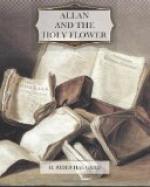Jerry, who was a plucky fellow, obeyed. Advancing with the steaming coffee, he held it under the Captain’s nose. Evidently he knew the man’s name, for I heard him say:
“O Babemba, the white lords, Macumazana and Wazela, ask if you will share their holy drink with them?”
I could perfectly understand the words, for these people spoke a dialect so akin to Zulu that by now it had no difficulty for me.
“Their holy drink!” exclaimed the old fellow, starting back. “Man, it is hot red-water. Would these white wizards poison me with mwavi?”
Here I should explain that mwavi or mkasa, as it is sometimes called, is the liquor distilled from the inner bark of a sort of mimosa tree or sometimes from a root of the strychnos tribe, which is administered by the witch-doctors to persons accused of crime. If it makes them sick they are declared innocent. If they are thrown into convulsions or stupor they are clearly guilty and die, either from the effects of the poison or afterwards by other means.
“This is no mwavi, O Babemba,” said Jerry. “It is the divine liquor that makes the white lords shoot straight with their wonderful guns which kill at a thousand paces. See, I will swallow some of it,” and he did, though it must have burnt his tongue.
Thus encouraged, old Babemba sniffed at the coffee and found it fragrant. Then he called a man, who from his peculiar dress I took to be a doctor, made him drink some, and watched the results, which were that the doctor tried to finish the pannikin. Snatching it away indignantly Babemba drank himself, and as I had half-filled the cup with sugar, found the mixture good.
“It is indeed a holy drink,” he said, smacking his lips. “Have you any more of it?”
“The white lords have more,” said Jerry. “They invite you to eat with them.”
Babemba stuck his finger into the tin, and covering it with the sediment of sugar, sucked and reflected.
“It’s all right,” I whispered to Stephen. “I don’t think he’ll kill us after drinking our coffee, and what’s more, I believe he is coming to breakfast.”
“This may be a snare,” said Babemba, who now began to lick the sugar out of the pannikin.
“No,” answered Jerry with creditable resource; “though they could easily kill you all, the white lords do not hurt those who have partaken of their holy drink, that is unless anyone tries to harm them.”
“Cannot you bring some more of the holy drink here?” he asked, giving a final polish to the pannikin with his tongue.
“No,” said Jerry, “if you want it you must go there. Fear nothing. Would I, one of your own people, betray you?”
“True!” exclaimed Babemba. “By your talk and your face you are a Mazitu. How came you—well, we will speak of that afterwards. I am very thirsty. I will come. Soldiers, sit down and watch, and if any harm happens to me, avenge it and report to the king.”




